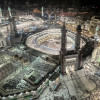Saudi Arabia's Perilous Pivot

The most dangerous moment for a bad government," the nineteenth-century French statesman and historian Alexis de Tocqueville observed, "is usually when it begins to reform itself." Reform, after all, implies that traditional norms and institutions may have already been discredited, but that alternative structures have yet to be firmly established.
Tocqueville's classic example was the regime of Louis XVI, whose attempts at reform quickly led to the French Revolution, and to his own execution in 1793. Another example is Mikhail Gorbachev's effort to reform the Soviet Union in the 1980s. By the end of 1991, the Soviet Union had collapsed and Gorbachev was out of power. Today, something similar could very well happen to the young Saudi Crown Prince, Mohammed bin Salman (widely known as MBS), as he takes steps to modernise his country.
Saudi Arabia has long maintained (relative) internal stability by spreading its enormous oil wealth among its subjects, and by imposing on Saudi society fundamentalist Islamic doctrines based on the austere Wahhabi tradition. After the Kingdom's founding in 1932, many Saudis enjoyed unprecedentedly high standards of living, and hundreds of members of the Saudi royal family were transformed from desert sheikhs into enormously rich members of the international moneyed elite. Various sons of the regime's founder, Abdulaziz Ibn Saud, succeeded each other as rulers of a kingdom that, following Arab tradition, bore the name of its founding and ruling dynasty (another is the current Hashemite Kingdom of Jordan).
In recent years, however, the Saudi regime has had to worry about its future. Plummeting oil prices followed the 2011-2012 Arab Spring, which brought down rulers in Tunisia, Egypt, Libya, and Yemen, and seriously challenged the al-Assad family's rule in Syria. MBS, for his part, has gotten the message: Since being named crown prince in June 2017, he has introduced sweeping reforms to the Saudi system.
Some of MBS's actions have garnered favourable international press coverage, not least his decrees allowing women to drive and curtailing the power of the religious police, who have long enforced public dress codes. These are positive steps toward emancipating the Kingdom from the more oppressive elements of Wahhabism. So, too, are the crown prince's statements calling for more tolerance of Christian, Jewish, and other non-Muslim communities, as well as his strengthening of ties with Israel.
Still, other new policies could prove problematic. MBS's plan for diversifying the Saudi economy to reduce its dependence on oil is still on the drawing board. But, in the meantime, he has launched a (euphemistically named) "anti-corruption" campaign that has raised red flags for outside observers. Since last November, MBS has had hundreds of members of the Saudi elite—including princes and businessmen with international profiles—arrested on dubious grounds, and with no regard for the rule of law.
To be sure, Saudi Arabia lacks a basic code of laws or legally enshrined rights. And many frustrated Saudis might welcome the fact that those rounded up in the purge have agreed, under duress, to "return" some of their obviously ill-gotten fortunes to the treasury which, of course, is controlled by the crown prince.
But even if MBS succeeds in shoring up his power and endearing himself to the people in the short term, it has become clear that he intends to rule as an authoritarian despot when he succeeds his father, King Salman bin Abdulaziz al-Saud. This would be a radical departure from the Kingdom's tradition of power-sharing among princes within a highly decentralised system.
MBS's hardnosed political style also has international implications. For starters, he has taken an increasingly tough line against Iran and that country's regional ambitions, thus exacerbating the Sunni-Shia divide. MBS's approach, which includes ill-informed statements comparing the Iranian regime to Nazi Germany, has the support of other Sunni countries such as Egypt and Jordan, and from US President Donald Trump and Israeli Prime Minister Binyamin Netanyahu. But it hardly bodes well for the region's stability.
Moreover, MBS's military intervention in Yemen has been a failure, and his decision to impose an embargo on Qatar—a small but wealthy Gulf country that challenges Saudi hegemony—has backfired. Similarly, his attempt late last year to depose Lebanese Prime Minister Saad Hariri ended in a fiasco.
It is hard to say where Saudi Arabia may be heading. The country certainly needs comprehensive reforms. But the jury is still out on whether MBS's approach is the right one. If he succeeds, he will emerge with a reputation as a reformer. Yet he clearly is not interested in establishing representative institutions or strengthening the rule of law, so his country will have become a personal dictatorship.
Alternatively, MBS's authoritarian tendencies and embarrassing foreign-policy failures might provoke internal opposition, both from the traditional elites he has vowed to decimate, and from the sizeable Shia minority in the Kingdom's Eastern Province, whose members may look to Iran as a protector.
And, on the international front, MBS's escalation with Iran could spin out of his control. Despite its recent weapons purchases from the US, Saudi Arabia would still be outmatched in a military confrontation with Iran. If such a confrontation does take place, one must hope that it will not lead to a wider regional war.
Shlomo Avineri is a professor of political science at the Hebrew University of Jerusalem and a former director-general of Israel's Ministry of Foreign Affairs.
Copyright: Project Syndicate, 2018.
www.project-syndicate.org
(Exclusive to The Daily Star)

 For all latest news, follow The Daily Star's Google News channel.
For all latest news, follow The Daily Star's Google News channel. 








Comments